In response to hundreds of protests sparked by the death of George Floyd, a black man who took his last breath under the knee of a police officer, United Methodist pastors preached about the hallowed breath of the Holy Spirit on Pentecost Sunday.
“It was difficult to hear George Floyd gasping for breath,” said the Rev. Judy Zabel, pastor of Hennepin Avenue United Methodist Church, Minneapolis.
“It was painful and horrific to watch.”
Protests were held in all 50 U.S. states after the death of Floyd and in remembrance of Breonna Taylor, Ahmaud Arbery and thousands of other black and brown people who have been killed. Peaceful in the daytime, many turned violent and ugly during the night, Zabel said.
“Breath is a gift and is precious and sacred. In John 20, Jesus breathed on the disciples and they received the Holy Spirit, which empowered them to move beyond their fear to become a church that is forgiven and is sent into the world to forgive others,” Zabel said.
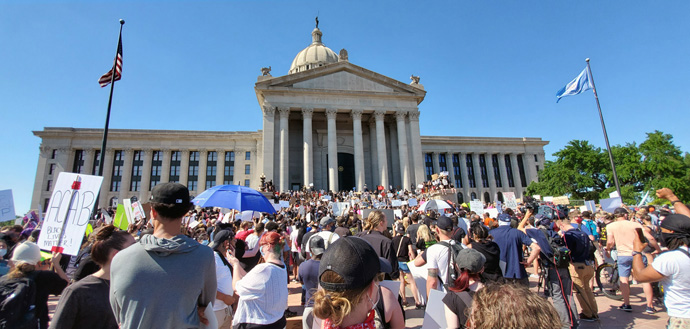
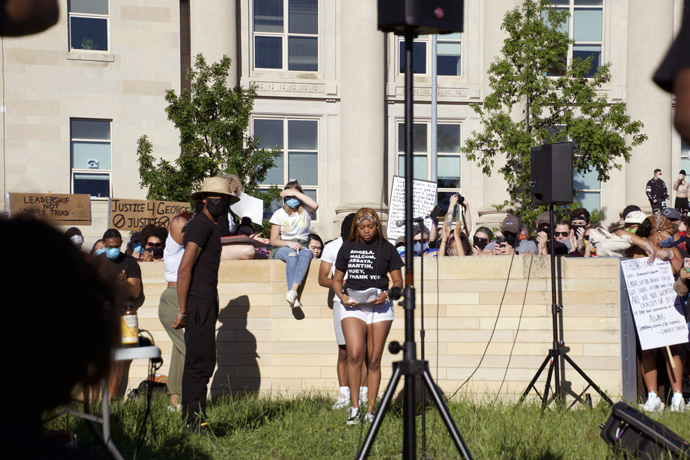
Florida Conference Bishop Kenneth Carter drew a direct contrast between Floyd’s haunting words “I can’t breathe” and the hallowed breath the Holy Spirit instills.
“I want you to know that God’s spirit is in every person, that every person is a soul, and this is why racism is a sin and a heresy,” Carter preached in a sermon recorded online. “It is not of God. Racism is incompatible with Pentecost. Racism is incompatible with the Holy Spirit.”
Many United Methodists called for an end to police brutality and participated in peaceful protests in support of Black Lives Matter.
Statements against racism
The United Methodist Council of Bishops
Bishop Frank J. Beard, Illinois Great Rivers Conference:
“It is the job of every Christian to serve as conduits of grace, mercy, and love…”
Bishop Kenneth Carter, Florida Conference:
A Spiritual Exercise for Dismantling Racism
“I do want us, particularly those of us who are the beneficiaries of white privilege, to understand that our African American sisters and brothers are gasping for breath. For 400 years, through slavery, lynching, apartheid (Jim Crow), the civil rights movement, institutionalized racism, and long-delayed police reform, the African American community has been crying out, ‘I can’t breathe.’ And yet, the knee of oppression, white supremacy, and inaction remains. If we see only riots and protests, we are not looking close enough,” said Bishop Bruce Ough, Dakotas-Minnesota Area.
The Council of Bishops said in a statement posted May 30 that the bishops support and embrace a statement by Ough in which he asked the church to address “a pandemic of racism, white supremacy, and white on black or brown violence.”
“As people of faith it is time to take a stand against any and all expressions of racism and white supremacy,” the council said.
The United Methodist Church of St. Paul and St. Andrew in Manhattan organized a “Spread the Flame” Facebook event May 31 that included online and in-person components.
Some members wore masks and spaced out along the sidewalks for a candlelight vigil in front of the church building while others posted photos of themselves holding candles and signs in their own neighborhoods or homes.
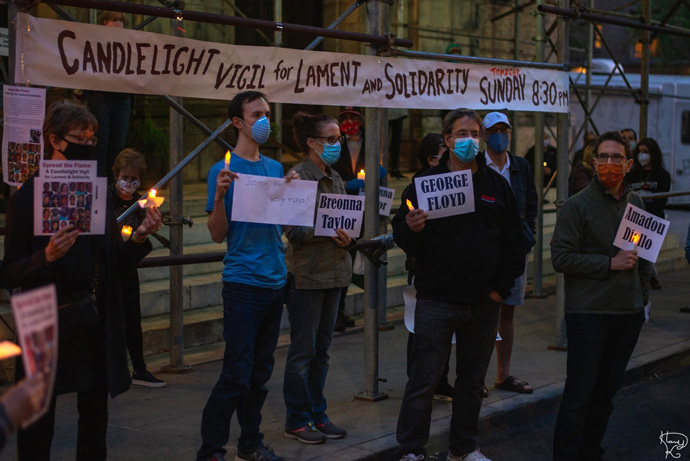
“We formed a line to separate the entire crowd from the police … before it got uglier,” said the Rev. Jason Perkowski, pastor of Faith United Methodist Church and Oregon Community United Methodist Church, just north of Lancaster in Lititz, Pennsylvania.
While an arrest was being made, one of the police officers broke away and started threatening protesters with a can of mace.
“I turned around (and) the police officer sprayed me directly in the face for no reason,” Perkowski said. “It was deliberate. I was blind for about 35 or 40 minutes.”
It was worth paying the price, he said.
“I am a person of privilege,” he said. “I can take my collar off and go home and decide it’s too much of a cost. … But persons of color don’t have that right.”
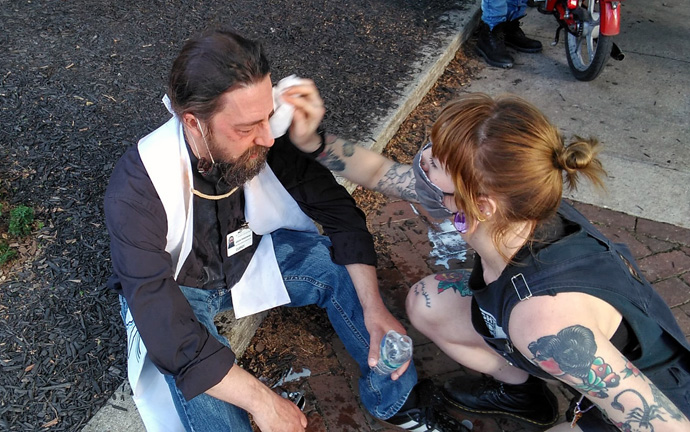
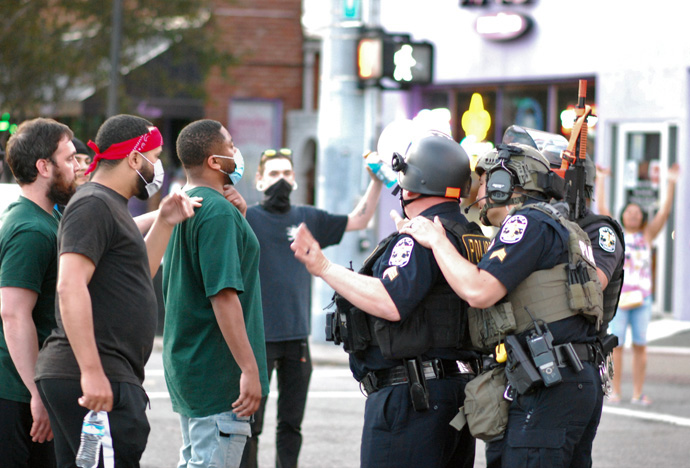
“I have little left but grief and heartache. Yet, with every ounce of my one hope, I pray we will learn that all cops are not bad, all black men are not thugs, and racism is a disease that must be admitted before it can be cured,” wrote Bishop Leonard E. Fairley, Kentucky Conference.
“Let us rise up and tell the world, the nation, every perpetrator spreading injustice, every perpetrator spreading hatred, death, and violence, that this is not the way. There is still a more excellent way to rise up and tell this divided world and nation that His name is Jesus, bringer of peace and healer with the power of reconciliation and redemptive sacrificial agape (love), as the only true light in darkness,” Fairley wrote.
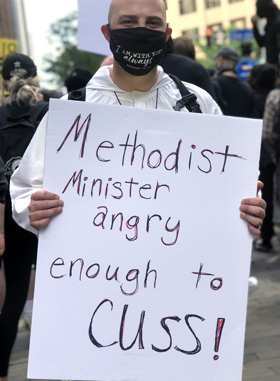
“Advocating for justice is hard work. It’s dirty work. It’s exhausting work. It’s heart-wrenching work,” said Hand, the Pittsburgh District superintendent. “I cannot sit back and watch the horridness of continued brutality of my black and brown siblings. I just can’t and I won’t.”
The Rev. Jeremy Smith, pastor of First Church Seattle, said he spent Saturday night calling and praying with church members who live downtown, ensuring they were safe after peaceful protests became violent.
“As Christ-followers, we are called both to gather in worship, and be sent forth in benediction to stand with and advocate for those in harm’s way,” he said. Smith had recorded his service earlier in the week but added a new call to action in response to the weekend’s events. He ended by asking listeners to give to anti-racist efforts.
In Dallas, the Rev. Richie Butler — pastor of St. Paul United Methodist, a historic African American church — preached a sermon titled “We Need a Racial Pentecost.”
He noted the many communications he’d had last week from white clergy, asking what they could do to address racism. The outreach left him hopeful and convinced that God was intervening in the crisis.
“If we could have dealt with racism on our own, it would have been taken care of a long time ago,” Butler said of African Americans. “We need our white brothers and sisters to take up this mantle.”
Louisiana Conference Bishop Cynthia Fierro Harvey, president of the Council of Bishops, said she was joining Missouri Conference Bishop Bob Farr in recommending that United Methodists read the books “White Fragility” by Robin DiAngelo and “How to Be an Antiracist” by Ibram X. Kendi.

“Imagine if every pastor, every church staff member, every congregation, every Sunday School class, every small group, every Bible study, read these books, had hard discussions and took real action,” she posted on Facebook. “Could The United Methodist Church be responsible for moving the needle of antiracism in the state of Louisiana?”
The Rev. Ryan Bennett, pastor of Lebanon First United Methodist Church, Tennessee, said his sermon was not on Pentecost because he is doing a series on the Beatitudes. This week was Beatitude 7, “Blessed are the peacemakers, for they will be called children of God.”
“If we don’t like what we see when there is injustice maybe that falls on us,” he said. “Jesus is not saying blessed are the peaceful but blessed are the peacemakers—that’s an active thing.”
The story was compiled by Gilbert, a UM News reporter in Nashville, with contributions from UM News team members Linda Bloom, Joey Butler, Heather Hahn, Sam Hodges and Jim Patterson.
News media contact: Vicki Brown at newsdesk@umcom.org or 615-742-5469. To read more United Methodist news, subscribe to the free Daily or Weekly Digests.
Like what you're reading? Support the ministry of UM News! Your support ensures the latest denominational news, dynamic stories and informative articles will continue to connect our global community. Make a tax-deductible donation at ResourceUMC.org/GiveUMCom.




